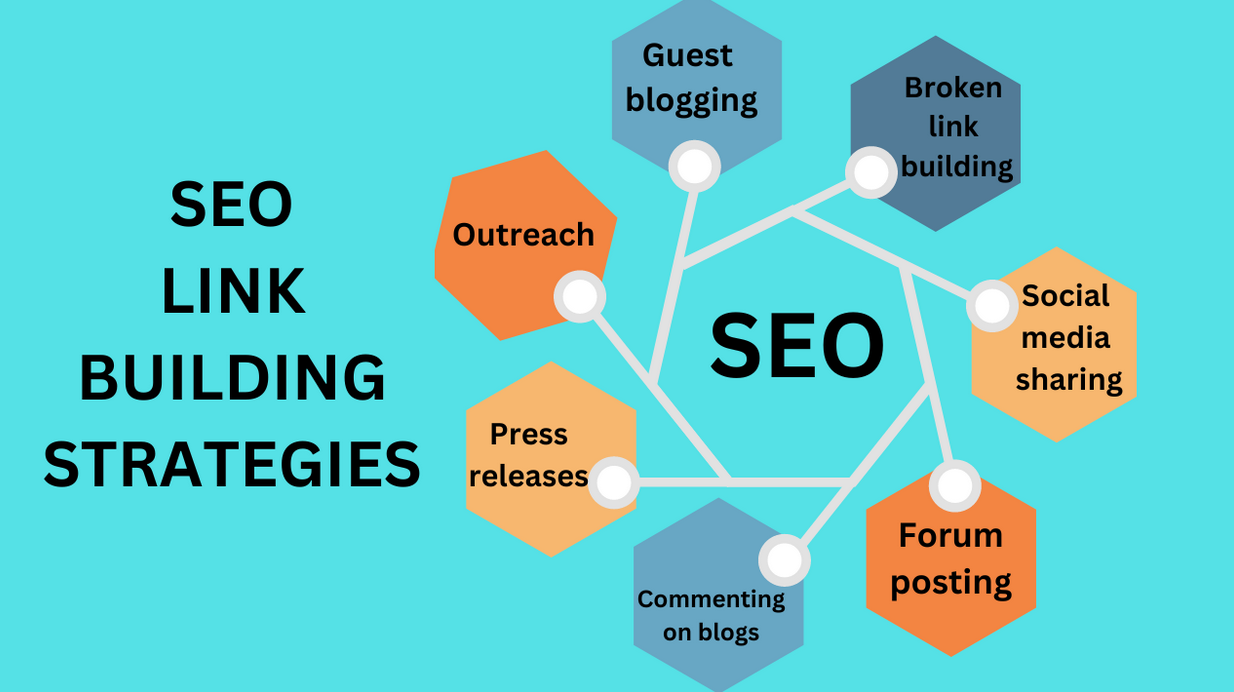
Link building is a crucial aspect of search engine optimization (SEO) that helps increase a website’s visibility and authority. By acquiring backlinks from reputable sites, you can significantly improve your ranking on search engine results pages (SERPs). Here are five easy link-building strategies that anyone can use:
Guest Blogging
Guest blogging involves writing and publishing articles on other websites within your industry. This method allows you to showcase your expertise while earning backlinks to your site.

Steps to Follow:
- Identify Target Blogs: Look for reputable blogs in your niche. Ensure these blogs have a good domain authority and a substantial readership.
- Pitch Your Ideas: Reach out to the blog owners with a well-crafted pitch. Propose topics that are relevant to their audience and demonstrate your expertise.
- Write High-Quality Content: Once your pitch is accepted, create an informative and engaging post. Include a bio with a link back to your website.
- Promote the Post: Share the guest post on your social media channels and encourage your audience to read it.
Benefits:
- Enhances your credibility as an expert in your field.
- Provides high-quality backlinks from authoritative sites.
- Expand your reach to a new audience.
Broken Link Building
Broken link building involves finding broken links on other websites and suggesting your content as a replacement. This strategy helps webmasters fix their broken links while you earn a backlink.

Steps to Follow:
- Find Broken Links: Use tools like Check My Links, Ahrefs, or Screaming Frog to identify broken links on websites in your niche.
- Create Valuable Content: Ensure you have relevant content that can replace the broken links. If you don’t, consider creating it.
- Reach Out to Webmasters: Contact the site owners or webmasters, inform them about the broken link, and suggest your content as a replacement.
- Follow-up: If you don’t receive a response, follow up with a polite reminder.
Benefits:
- Provides a win-win situation for both parties.
- It helps you build relationships with other webmasters.
- Can lead to multiple backlinks if the broken link was used by several sites.
Skyscraper Technique
The Skyscraper Technique involves finding popular content in your niche, creating something even better, and then reaching out to those who linked to the original content to link to your improved version.
Steps to Follow:
- Identify Popular Content: Use tools like BuzzSumo to find content that has garnered a lot of backlinks.
- Create Superior Content: Analyze the popular content and create something more comprehensive, updated, and visually appealing.
- Find Linkers: Use SEO tools to identify sites that are linked to the original content.
- Outreach: Contact these sites, highlight your superior content, and suggest they link to it instead of the older content.
Benefits:
- Leverages existing interest in popular topics.
- Increases the likelihood of getting backlinks since the original content was already well-received.
- Position your content as a go-to resource in your niche.
Resource Page Link Building
Resource page link building involves getting your content listed on resource pages, which are pages dedicated to curating useful links on a specific topic.

Steps to Follow:
- Find Resource Pages: Use search queries like “keyword + resource page” or “keyword + useful links” to identify relevant resource pages.
- Evaluate Quality: Ensure the resource page is reputable and relevant to your niche.
- Create Valuable Content: Ensure you have high-quality, informative content that would be a good fit for the resource page.
- Outreach: Reach out to the webmaster, suggest your content, and explain why it would be a valuable addition to their resource page.
Benefits:
- Resource pages are typically authoritative and can provide high-quality backlinks.
- These pages are regularly updated, increasing the chances of your link being added.
- Helps in building connections with other webmasters in your industry.
Utilize Social Media and Online Communities
Engaging in social media platforms and online communities can help you earn backlinks naturally. By sharing valuable content and participating in discussions, you can attract attention and encourage others to link to your site.
Steps to Follow:
- Identify Relevant Platforms: Determine which social media platforms and online communities (like Reddit, Quora, and industry-specific forums) your target audience uses.
- Share Valuable Content: Regularly post high-quality content that addresses common questions and problems in your niche.
- Engage with the Community: Participate in discussions, answer questions, and provide insights without being overly promotional.
- Build Relationships: Network with influencers and active community members who can help spread the word about your content.
Benefits:
- Increases your visibility and authority within your industry.
- Encourages natural backlinks from those who find your content valuable.
- Enhances your reputation and builds trust with your audience.
Final Tips for Effective Link Building
- Quality Over Quantity: Focus on acquiring high-quality backlinks from reputable sites rather than a large number of low-quality links.
- Build Relationships: Networking with other professionals in your industry can open doors for collaboration and link-building opportunities.
- Be Consistent: Link building is an ongoing process. Regularly create valuable content and actively seek out new opportunities.
- Diversify Your Strategies: Use a mix of different link-building strategies to maximize your chances of success.
- Monitor Your Progress: Use tools like Google Analytics and Ahrefs to track your backlinks and assess the effectiveness of your strategies.
By implementing these five easy link-building strategies, you can enhance your website’s SEO, increase its visibility, and drive more organic traffic. Remember, the key to successful link-building is creating valuable content and building genuine relationships within your industry.
The post 5 Easy Link Building Strategies That Anyone Can Use first appeared on Newsdirect.

















